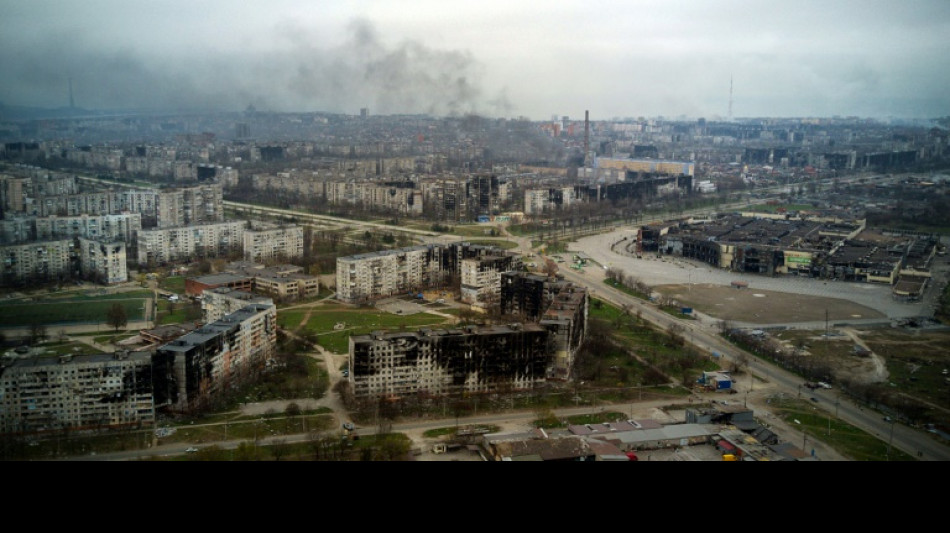
-
 Amazon launches first Starlink-rival internet satellites
Amazon launches first Starlink-rival internet satellites
-
US lost seven multi-million-dollar drones in Yemen area since March
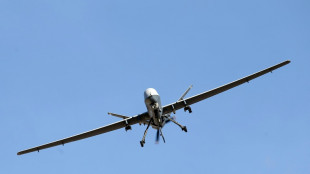
-
 Bucks blow as Lillard suffers torn Achilles: team
Bucks blow as Lillard suffers torn Achilles: team
-
Putin orders three-day truce amid new US warnings

-
 Real Madrid's Ancelotti agrees Brazil deal - reports
Real Madrid's Ancelotti agrees Brazil deal - reports
-
ChatGPT adds shopping help, intensifying Google rivalry

-
 Global stocks mixed amid trade hopes as markets await tech earnings
Global stocks mixed amid trade hopes as markets await tech earnings
-
Commanders heading back to D.C. after inking $3.7 bln stadium deal
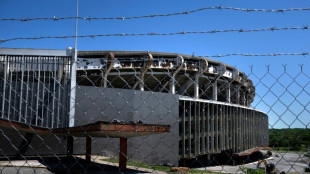
-
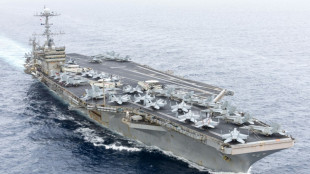 US warplane falls off aircraft carrier into Red Sea
US warplane falls off aircraft carrier into Red Sea
-
Feisty Arteta urges Arsenal fans to 'bring boots' to PSG Champions League clash

-
 Bucks blow as Lillard suffers ruptured Achilles: reports
Bucks blow as Lillard suffers ruptured Achilles: reports
-
No power, no phone, no transport -- Spain in a panic
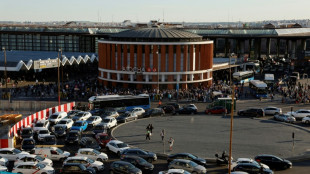
-
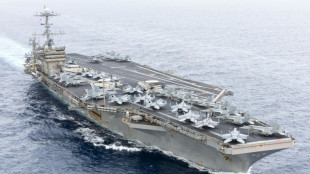 US warplane went overboard into Red Sea: Navy
US warplane went overboard into Red Sea: Navy
-
'Like a dream' as IPL's 14-year-old Suryavanshi becomes youngest to hit T20 ton
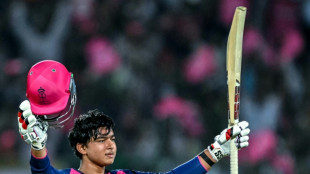
-
 Luis Enrique says PSG have improved since October Arsenal loss
Luis Enrique says PSG have improved since October Arsenal loss
-
UN food, refugee agencies warn of huge cuts after funding losses

-
 Trump trade war dominates BRICS meeting in Brazil
Trump trade war dominates BRICS meeting in Brazil
-
Rashford expected to miss rest of Aston Villa season

-
 IPL's 14-year-old Suryavanshi youngest to hit T20 ton as Rajasthan rule
IPL's 14-year-old Suryavanshi youngest to hit T20 ton as Rajasthan rule
-
Halle Berry, Jeremy Strong to join Cannes film festival jury: organisers

-
 Klopp congratulates Liverpool on Premier League triumph
Klopp congratulates Liverpool on Premier League triumph
-
Violence-weary Trinidadians vote in general election

-
 Abuse scandal in focus in search for new pope
Abuse scandal in focus in search for new pope
-
Prince William and Kate mark wedding anniversary in Scotland

-
 Amazon set for launch of Starlink-rival satellites
Amazon set for launch of Starlink-rival satellites
-
London mayor Sadiq Khan targets Olympic history for city

-
 Stock markets diverge amid trade hopes, ahead of earnings
Stock markets diverge amid trade hopes, ahead of earnings
-
Canada votes as Trump renews US takeover push

-
 Massive blackout hits all of Spain and Portugal
Massive blackout hits all of Spain and Portugal
-
Conclave starts May 7, cardinals say new pope must tackle abuse

-
 BRICS ministers meet in Brazil over Trump trade policies
BRICS ministers meet in Brazil over Trump trade policies
-
Trump escalates immigration crackdown to mark 100 days

-
 Outkast, White Stripes, Cyndi Lauper among Rock Hall inductees
Outkast, White Stripes, Cyndi Lauper among Rock Hall inductees
-
Putin orders three-day truce in May but Ukraine asks 'Why wait?'

-
 Eubank Jr discharged from hospital following boxing grudge match
Eubank Jr discharged from hospital following boxing grudge match
-
China deploys army of fake NGOs at UN to intimidate critics: media probe

-
 Empty shelves? US Treasury secretary not concerned 'at present'
Empty shelves? US Treasury secretary not concerned 'at present'
-
Slot told Liverpool they could win the league at season start: Konate
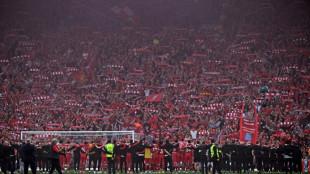
-
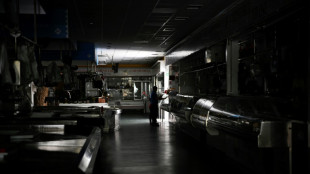 Spain brought to a halt by huge blackout
Spain brought to a halt by huge blackout
-
Stock markets mostly higher amid trade talk hopes

-
 Conclave starts May 7, with cardinals saying new pope must tackle abuse
Conclave starts May 7, with cardinals saying new pope must tackle abuse
-
Massive blackout hits Spain and Portugal

-
 Ruediger 'must show respect to others' says Germany boss Voeller
Ruediger 'must show respect to others' says Germany boss Voeller
-
As Canada votes, Trump pushes US takeover plan

-
 Ten on trial in Paris over 2016 gunpoint robbery of Kim Kardashian
Ten on trial in Paris over 2016 gunpoint robbery of Kim Kardashian
-
African players in Europe: Salah scores, takes selfies as Reds seal title

-
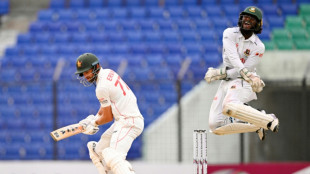 Bangladesh spinner Taijul's 5 wickets trigger Zimbabwe collapse in 2nd Test
Bangladesh spinner Taijul's 5 wickets trigger Zimbabwe collapse in 2nd Test
-
French mosque murder suspect, 21, surrenders in Italy

-
 Mayor Khan keen for London to make Olympics history
Mayor Khan keen for London to make Olympics history
-
Iranian president visits Azerbaijan as ties warm


Mariupol's tunnel warriors seek to slow Russian onslaught
As Russian forces close in on the southern Ukrainian port city of Mariupol, a small number of resistance fighters hope to slow them down using a tunnel system below a vast industrial site as their base.
Experts say the fall of the city, seen as strategically vital for Russian plans to attack eastern Ukraine, is inevitable.
But holdouts in their underground bases hope to make conquering the Sea of Azov port as hard as possible for the attackers.
The urban landscape where the Ukrainian resistance plans to take on the invaders seems almost tailor-made for guerrilla warfare, with sprawling rail lines, warehouses, coal furnaces, factories, chimneys and tunnels.
The maze-like area is a metal works complex, Azovstal, owned by Metinvest, which is run by Ukraine's richest man Rinat Akhmetov.
It has been the focus of urban fighting in Mariupol, just like the nearby Azovmash factory which makes rail components, cranes and other large metal structures.
"It's a city within a city," said Eduard Basurin, a representative for pro-Russian separatists in the eastern Donetsk region.
"There are several underground levels that date back to Soviet times which you can't bombard from above. You have to go underground to clean them out, and that will take time."
Entering the tunnels would be all but impossible for Russian troops, according to Alexander Grinberg, analyst at the Jerusalem Institute for Strategy and Security.
- 'They can try' -
"They can try, but they'll be slaughtered because the defenders of the tunnel will absolutely have the tactical upper hand," he told AFP.
Fighters have in the past used tunnel systems to great effect in their struggle against superior forces.
The Viet Cong made the vast Cu Chi tunnel system near Saigon a base for attacks against US troops and Hamas has used tunnels in their fight against the Israeli army.
The Islamic State group's tunnel system in Mosul, Iraq, allowed its fighters to surprise American troops with sudden appearances seemingly out of nowhere.
But the most memorable example dates back to World War II and the battle of Stalingrad with its fierce fighting in the Red October industrial complex.
"The Soviets used underground passages, sewers and tunnels to get behind German lines," a French military source told AFP.
A sapper unit discovered a former factory used by German troops, stacked three tonnes of explosives underneath and blew up the entire complex, burying the Germans in the rubble, the source said.
The astute use of tunnels has lost none of its effectiveness in the 80 years since, rendering enemy artillery, air strikes and snipers virtually useless.
Satellite surveillance is also of limited use against combatants hiding below ground, as is technical intelligence, the spying on enemy weapons.
However, as analysts point out, the underground system only works if the network is vast and fighters have enough ammunition, food and water, which requires meticulous advance planning.
Soldiers deployed underground also need extremely good training to be operational in this unusual combat environment, said James Rands at British defence intelligence specialists Janes.
- 'Inherent dangers' -
"The enclosed spaces mean engagements occur at shorter ranges, limiting the effectiveness of some small arms," he said.
Close-range use of weapons also carries "a significant risk of tunnel collapse and inherent dangers to the forces employing them", he said.
In addition, commanding troops underground is difficult because standard communications do not work well, and tunnel networks are not usually well mapped, he said.
The evacuation of wounded soldiers is also very cumbersome, Rands added.
Despite all the advantages for the defenders, the tunnel network can possibly still be taken if, as is likely, the Ukrainians lack key equipment in sufficient quantity, such as night-vision gear, analysts said.
It may also be difficult to counter the potential use by the Russians of large quantities of water to flood the tunnels, or of gas or chemical products to force the Ukrainians to the surface.
Although Russian President Vladimir Putin said Tuesday that Russia was pursuing its Ukraine operation "calmly", there is a chance that the tunnel wars will be anything but -- and last for some time.
O.M.Souza--AMWN